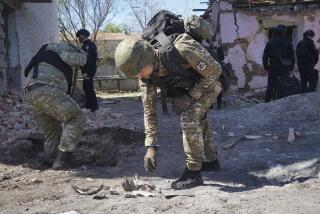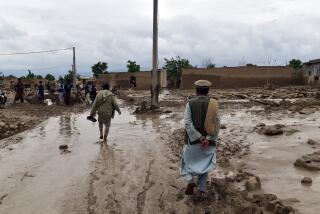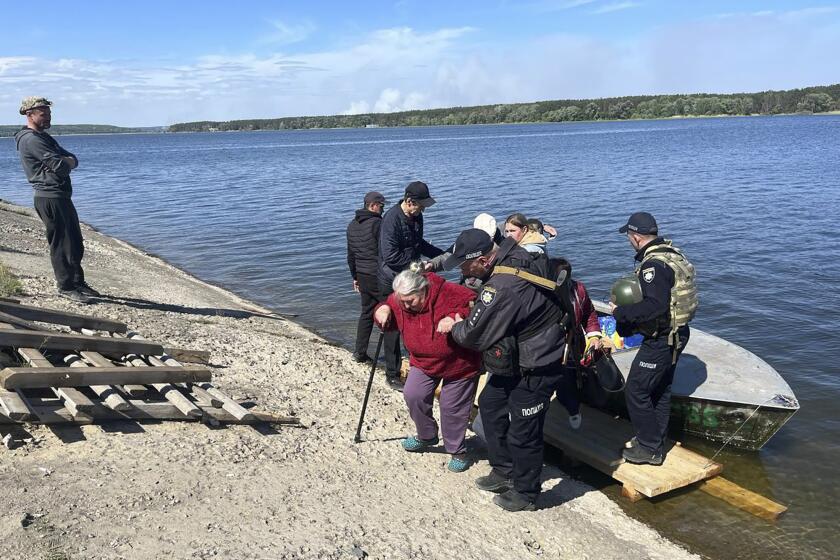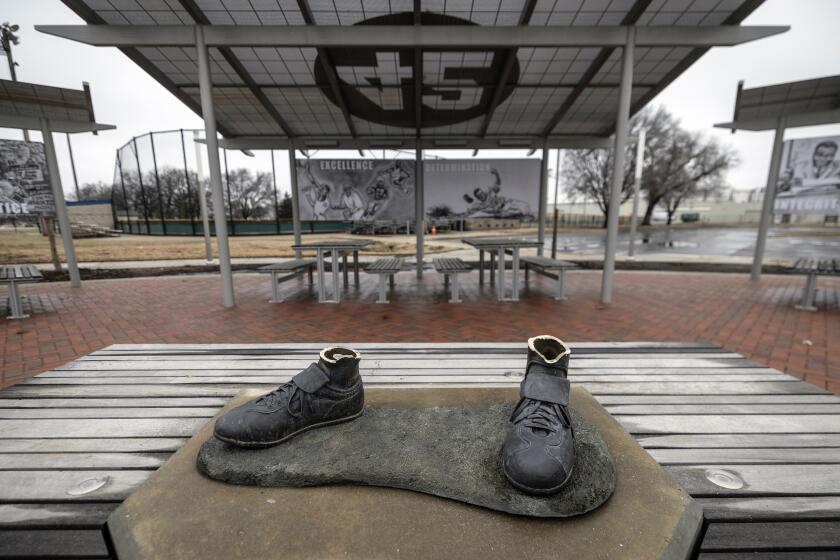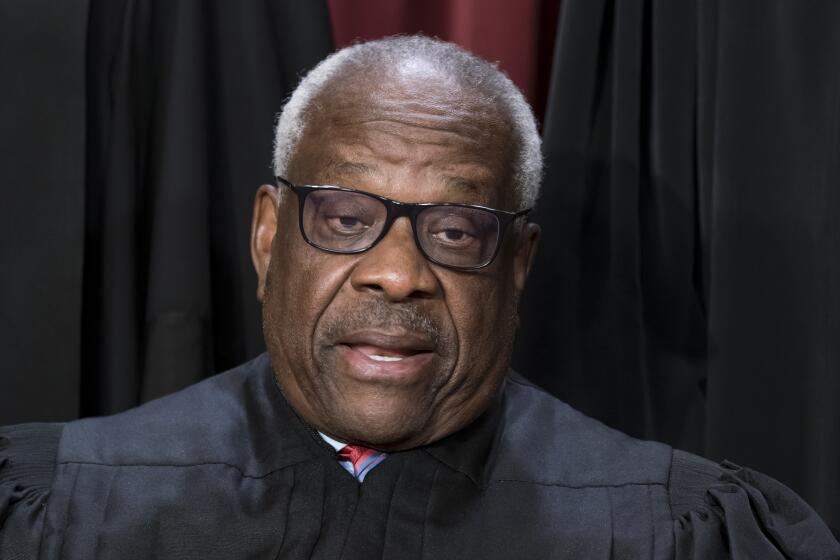Moderates Lead in Kosovo’s First Free Elections
A party led by moderate ethnic Albanian leader Ibrahim Rugova was the projected winner in the first free and democratic Kosovo-wide elections Saturday.
The balloting for a new parliament, which will elect a president, took place with no significant incidents, although some attempts were made to intimidate voters in the Serb-dominated part of the northern city of Kosovska Mitrovica, international authorities said.
“This was a day when democracy was victorious,” said Daan Everts, head of the Kosovo mission of the Organization for Security and Cooperation in Europe, which organized the election.
Despite a call by some local Serbian leaders for a boycott to avoid legitimizing the new institutions of self-rule, enough Kosovo Serbs participated to give them a relatively large number of seats in the Kosovo Assembly, Everts told a late-evening news conference. He estimated turnout at 46% among Serbs living in Kosovo and 57% among eligible Kosovo Serb voters temporarily residing in other parts of Serbia. Turnout in primarily ethnic Albanian areas of Kosovo was 65%, he said.
Everts said that many registered voters work and live outside Yugoslavia and thus were not able to vote Saturday.
A party led by former guerrilla leader Hashim Thaci placed a strong second, according to early projections. These results would mean that only a coalition of parties can control the new parliament in the U.N.-administered province, which officially remains part of Serbia, the dominant republic of Yugoslavia.
Rugova’s party appeared to have won enough seats to make him a strong favorite to win the presidency. The president will nominate a prime minister, who will head a government with broad powers over most aspects of ordinary life in Kosovo.
As provided by a 1999 U.N. Security Council resolution, ultimate control will remain in the hands of chief U.N. administrator Hans Haekkerup until the international community decides that the time is ripe to seek a permanent settlement of Kosovo’s status.
For ethnic Albanians--who make up the great majority of Kosovo’s population--the election was largely a referendum on who will do the best job of achieving their shared goal of independence.
“These elections are especially important because they are about the freedom and independence of Kosovo, its economic development and the prosperity of all its citizens,” Rugova said as he cast his ballot.
Rugova’s party “has a lot of experience,” Kushtrim Metaj, a university student, said after casting his ballot. “It’s a party that supports peace and stability, and those things are important for all people of Kosovo.”
The Council for the Defense of Human Rights and Freedoms, a nonpartisan local election monitoring organization, announced at a late evening news conference that its statistical projections showed Rugova’s Democratic League of Kosovo winning 47% of the vote and Thaci’s Democratic Party of Kosovo with 26%. The Alliance for the Future of Kosovo, headed by Ramush Haradinaj, a former commander of the Kosovo Liberation Army, was projected with 9%, and the only slate of Serbian candidates, known as Return, had 8%.
Of the 120 Kosovo Assembly seats, 10 are reserved for Serbs and 10 for other minorities. The remaining seats will be apportioned according to the percentage of votes received by each party, so if these projections prove exact, Rugova’s party would hold 47 seats, Thaci’s party 26, and Serbs 18--the 10 reserved seats plus eight more based on the election results. The system is designed to ensure that ethnic minorities have a disproportionately large representation in parliament, even as the majority ethnic Albanians are sure to hold most of the seats.
“It’s a nice surprise for me, that participation [by Serbs] is so high in Kosovo,” said Oliver Ivanovic, a Serbian leader in ethnically divided Kosovska Mitrovica. “It’s very important to have full support of our people. Now we can act properly. . . . I think we will have a lot of hard and difficult decisions to make.”
The new institutions are intended to be “an instrument for reconciliation [between ethnic groups], for bringing Kosovo forward,” Haekkerup said. Although they may help lay the groundwork for a decision on the final status of Kosovo, their creation does not prejudge whether the province’s future lies in independence or as part of Yugoslavia, he added.
International control of Kosovo was established as a result of the North Atlantic Treaty Organization’s 78-day bombing campaign intended to force former Yugoslav President Slobodan Milosevic to end his crackdown on the province’s ethnic Albanians.
After international forces entered Kosovo in June 1999, nearly 200,000 Serbs and other non-Albanians fled the province in fear of reprisal attacks by ethnic Albanians. Between 80,000 and 100,000 Serbs remain in Kosovo, which has a population estimated at more than 2 million.
In the Serbian enclave of Gracanica, a shopkeeper who was willing to give only his first name, Dragan, said Saturday afternoon that he had not yet decided whether to vote. He favors the stronger Serbian representation in the new Kosovo Assembly that a high Serbian turnout would bring, he said. But at the same time, strong Serbian participation “would be giving legitimacy to future possible independence,” he said. “This is the only fear we have.”
Many Serbs like him ultimately cast ballots. Serbian participation was extremely low throughout midafternoon and then surged before polling booths closed. Everts said he believed that once prospective voters saw other Serbs casting ballots, they “came to the conclusion it was the right thing to do.”
In the Serb-dominated part of Kosovska Mitrovica, however, tough-looking young Serbian men outside a polling station at a technical high school attempted to intimidate voters into not casting ballots, according to a Serbian resident of the city who spoke on condition of anonymity. The young men tried to take photographs of people coming to vote and threatened them with future retaliation, she said.
International peacekeeping authorities later said that French soldiers had broken up the intimidation effort.
More to Read
Start your day right
Sign up for Essential California for news, features and recommendations from the L.A. Times and beyond in your inbox six days a week.
You may occasionally receive promotional content from the Los Angeles Times.

